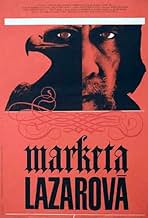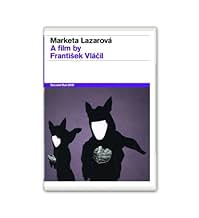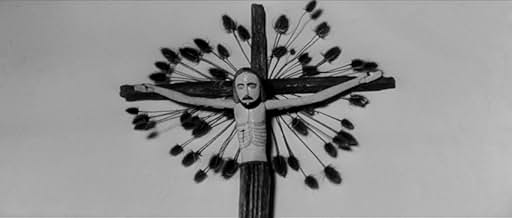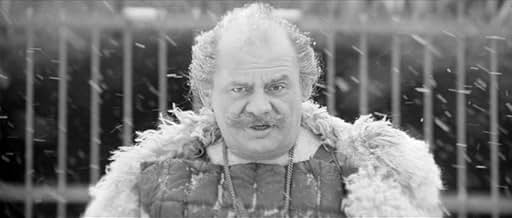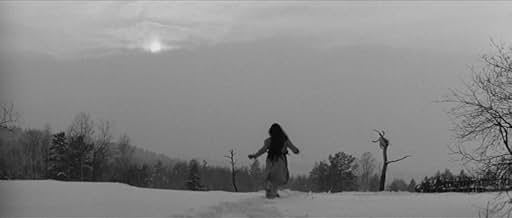IMDb रेटिंग
7.8/10
6.5 हज़ार
आपकी रेटिंग
अपनी भाषा में प्लॉट जोड़ेंA grim portrayal of the shift from Paganism to Christianity in medieval central Europe - as a young virgin promised to God is kidnapped and raped by a marauder who her religious father seeks... सभी पढ़ेंA grim portrayal of the shift from Paganism to Christianity in medieval central Europe - as a young virgin promised to God is kidnapped and raped by a marauder who her religious father seeks to kill in return.A grim portrayal of the shift from Paganism to Christianity in medieval central Europe - as a young virgin promised to God is kidnapped and raped by a marauder who her religious father seeks to kill in return.
- निर्देशक
- लेखक
- स्टार
- पुरस्कार
- 2 जीत और कुल 2 नामांकन
फ़ीचर्ड समीक्षाएं
UK DVD label Second Run which specializes in rare Eastern European classics have, over the last couple of years, released a handful of films I have long yearned to watch (and which, as a result of this viewing of MARKETA LAZAROVA, I've just ordered online): Aleksander Ford's KNIGHTS OF THE TEUTONIC ORDER (1960; a disc which despite its being trimmed by the BBFC and in an altered aspect ratio, I couldn't sensibly forego), Jerzy Kawalerowicz's MOTHER JOAN OF THE ANGELS (1961; their very first release which I purchased in London last year), Jan Nemec's THE PARTY AND THE GUESTS (1966) and, debuting in a few days' time, Miklos Jancso's THE ROUND-UP (1965).
Unlike these movies, I wasn't consciously aware of MARKETA LAZAROVA when the infectious buzz about its impending release hit the Internet but, as I later found out, the film was actually mentioned, ever so fleetingly, in one of my father's old movie magazines. Again, when the DVD was eventually released, there was a negative vibe about the alleged visual deficiencies of Second Run's disc but, in hindsight, these were quite needlessly exaggerated. Ultimately, an awesome and, as it turned out, essential movie experience such as this one deserves to be seen right away and to keep waiting for that perfectly pristine print to rear its unlikely head is utterly pointless. Alas, the Czech New Wave is still a largely undiscovered segment of cinema history for me so I am not in a position to suitably assess whether MARKETA LAZAROVA is indeed the greatest Czech movie ever made (as it had been judged in a 1998 poll among 100 native film critics). Suffice it to say that this ostensibly obscure film has by now figured in a number of published all-time best polls and, consequently, its status is deservedly well-established. Hopefully, as it was in my case, Second Run's DVD will serve as the introduction to many an adventurous film enthusiast in the future
Since my overall experience of MARKETA LAZAROVA was such a positive one, it seems only right to get my quibbles with the film out of the way first and there are basically two of them: a muddled storyline which, for most of the film's first half, left me rather perplexed as to which of the two warring factions the characters whose exploits I was following on screen belonged and, while things got clearer as time went by, the individuals themselves (with the obvious exception of the titular character) did not exactly garner much sympathy. I suppose that for a movie with a running time of almost three hours these flaws would usually be significantly detrimental to one's enjoyment of the whole: however, the definite impression I was left with while watching was that, despite the eponymous title, the director's intent was not to narrate a conventional life history but actually to create a visual tapestry of the medieval era onto celluloid and, in this regard, to say that he succeeded would be the understatement of the year. In fact, along with Andrei Tarkovsky's ANDREI RUBLEV (shot in 1965 but actually unreleased until 1972), I'd venture to say that MARKETA LAZAROVA is the most convincingly realized cinematic portrait of those turbulent times, distinguishing Frantisek Vlacil's vision as an overwhelmingly expansive and stunningly visual one.
In this context, it is quite appropriate that the titular character (played by a future Presidential candidate, the beautiful Magda Vasaryova) is practically silent for most of the film; she is first seen about to enter into a holy order but is eventually abducted, raped and impregnated by the feral Mikolas (who was actually raised by wolves) whom she comes to love eventually. Another parallel and equally unlikely relationship we are witness to is the one which blossoms between the earthy Alexandria (who is also involved in some brief but startling instances of full-frontal nudity) and her young, aristocratic captive who happens to be a German Bishop; it is worth noting here that Alexandria had already almost cost the life of her brother Adam when his own father had severed his arm in punishment for their incestuous coupling! Interestingly, the film is divided into two parts respectively entitled "Straba" and "The Lamb Of God" and punctuated by frequent, verbose, half Dickensian-half picaresque chapter headings, not to mention the presence on the soundtrack of a bemused narrator who, at one point, even takes on the role of God while interacting with a monk! This is not the only instance of whimsical inventiveness present in MARKETA LAZAROVA perhaps adopted by the director to counter the oppressively bleak ambiance created by the forbidding snowy landscape and dense forest settings which can actually claim to be the film's true main characters. As I said previously, striking images abound throughout: the intermittent, sinister appearance of the pack of wolves is impressively eerie, the distraught monk looking for his lamb and eventually losing her decapitated head down a clifftop, a horse drowning in a puddle on a deserted no man's land, the camera occasionally taking on a feverishly first person viewpoint according to the character at hand, the effective use of unheralded off-kilter compositions (including a totally bizarre arrow-in-the-eye shot!), etc. Having said that, Zdenek Liska's choral, percussive and electronic score is equally imaginative and, as a result, extraordinarily complementary to the uniquely sombre spectacle on constant display.
Unlike these movies, I wasn't consciously aware of MARKETA LAZAROVA when the infectious buzz about its impending release hit the Internet but, as I later found out, the film was actually mentioned, ever so fleetingly, in one of my father's old movie magazines. Again, when the DVD was eventually released, there was a negative vibe about the alleged visual deficiencies of Second Run's disc but, in hindsight, these were quite needlessly exaggerated. Ultimately, an awesome and, as it turned out, essential movie experience such as this one deserves to be seen right away and to keep waiting for that perfectly pristine print to rear its unlikely head is utterly pointless. Alas, the Czech New Wave is still a largely undiscovered segment of cinema history for me so I am not in a position to suitably assess whether MARKETA LAZAROVA is indeed the greatest Czech movie ever made (as it had been judged in a 1998 poll among 100 native film critics). Suffice it to say that this ostensibly obscure film has by now figured in a number of published all-time best polls and, consequently, its status is deservedly well-established. Hopefully, as it was in my case, Second Run's DVD will serve as the introduction to many an adventurous film enthusiast in the future
Since my overall experience of MARKETA LAZAROVA was such a positive one, it seems only right to get my quibbles with the film out of the way first and there are basically two of them: a muddled storyline which, for most of the film's first half, left me rather perplexed as to which of the two warring factions the characters whose exploits I was following on screen belonged and, while things got clearer as time went by, the individuals themselves (with the obvious exception of the titular character) did not exactly garner much sympathy. I suppose that for a movie with a running time of almost three hours these flaws would usually be significantly detrimental to one's enjoyment of the whole: however, the definite impression I was left with while watching was that, despite the eponymous title, the director's intent was not to narrate a conventional life history but actually to create a visual tapestry of the medieval era onto celluloid and, in this regard, to say that he succeeded would be the understatement of the year. In fact, along with Andrei Tarkovsky's ANDREI RUBLEV (shot in 1965 but actually unreleased until 1972), I'd venture to say that MARKETA LAZAROVA is the most convincingly realized cinematic portrait of those turbulent times, distinguishing Frantisek Vlacil's vision as an overwhelmingly expansive and stunningly visual one.
In this context, it is quite appropriate that the titular character (played by a future Presidential candidate, the beautiful Magda Vasaryova) is practically silent for most of the film; she is first seen about to enter into a holy order but is eventually abducted, raped and impregnated by the feral Mikolas (who was actually raised by wolves) whom she comes to love eventually. Another parallel and equally unlikely relationship we are witness to is the one which blossoms between the earthy Alexandria (who is also involved in some brief but startling instances of full-frontal nudity) and her young, aristocratic captive who happens to be a German Bishop; it is worth noting here that Alexandria had already almost cost the life of her brother Adam when his own father had severed his arm in punishment for their incestuous coupling! Interestingly, the film is divided into two parts respectively entitled "Straba" and "The Lamb Of God" and punctuated by frequent, verbose, half Dickensian-half picaresque chapter headings, not to mention the presence on the soundtrack of a bemused narrator who, at one point, even takes on the role of God while interacting with a monk! This is not the only instance of whimsical inventiveness present in MARKETA LAZAROVA perhaps adopted by the director to counter the oppressively bleak ambiance created by the forbidding snowy landscape and dense forest settings which can actually claim to be the film's true main characters. As I said previously, striking images abound throughout: the intermittent, sinister appearance of the pack of wolves is impressively eerie, the distraught monk looking for his lamb and eventually losing her decapitated head down a clifftop, a horse drowning in a puddle on a deserted no man's land, the camera occasionally taking on a feverishly first person viewpoint according to the character at hand, the effective use of unheralded off-kilter compositions (including a totally bizarre arrow-in-the-eye shot!), etc. Having said that, Zdenek Liska's choral, percussive and electronic score is equally imaginative and, as a result, extraordinarily complementary to the uniquely sombre spectacle on constant display.
I bought the Second Run DVD, after reading about how this epic was considered the best Czech film, ever.
To be honest, not many other contenders spring to mind. And, who voted? As it was on special offer and I am a sucker indeed for that Russian style of gritty monochrome composition and beauty, how could I resist?
I'm on its second play and I'm no nearer following the story. There is undoubtedly one. Am I too overawed by imagery that I could only dream of? (even if I were able to!) Is it the savagery and feel of a certain reality?
I don't know. I can sense, however, an art film made with passion and unbounded imagination. Of folklore, both in a historical sense and a cultural one and of religious rebellion. Like Kurosawa at his best, an immediacy and connection. Yet, it is also dreamlike and distant, with an air of mysticism that I found increasingly confusing. The length of film means that by halfway through I've no idea what is going on, but am still enjoying what I see.
Unfortunately, I have docked a mark for the forced, electronically induced echo on the dialogue that probably is supposed to denote that other worldly strangeness. It seems to seep in and hang about, its constant use here cheapens the effect to being a bit of a pain. Whereas Kurosawa used that SFX so effectively on, say Roshomon, by using just once or twice.
I could see elements of the Brazilian 'Black God, White Devil' and like others have commented, Kurosawa's 'Seven Samurai' and Tarkov's 'Andrei Rublev'. Maybe some of the black magic in Bergman's late medieval classics, such as 'The Virgin Spring' and 'The Seventh Seal'. But more psychotic, more manic and disturbing than all these put together. Like madness itself, there is a real beauty deeply ingrained amongst the mayhem.
My conclusion would have to be that if you get the chance, go for it. Take it with a large pinch of salt and sprinkle sparingly. None of it is truly horrific or unpalatable to most adults and don't worry if you don't "get it". Be slightly proud and immodest that you've found a tarnished gem that hardly anyone else will have seen or are ever likely to.
To be honest, not many other contenders spring to mind. And, who voted? As it was on special offer and I am a sucker indeed for that Russian style of gritty monochrome composition and beauty, how could I resist?
I'm on its second play and I'm no nearer following the story. There is undoubtedly one. Am I too overawed by imagery that I could only dream of? (even if I were able to!) Is it the savagery and feel of a certain reality?
I don't know. I can sense, however, an art film made with passion and unbounded imagination. Of folklore, both in a historical sense and a cultural one and of religious rebellion. Like Kurosawa at his best, an immediacy and connection. Yet, it is also dreamlike and distant, with an air of mysticism that I found increasingly confusing. The length of film means that by halfway through I've no idea what is going on, but am still enjoying what I see.
Unfortunately, I have docked a mark for the forced, electronically induced echo on the dialogue that probably is supposed to denote that other worldly strangeness. It seems to seep in and hang about, its constant use here cheapens the effect to being a bit of a pain. Whereas Kurosawa used that SFX so effectively on, say Roshomon, by using just once or twice.
I could see elements of the Brazilian 'Black God, White Devil' and like others have commented, Kurosawa's 'Seven Samurai' and Tarkov's 'Andrei Rublev'. Maybe some of the black magic in Bergman's late medieval classics, such as 'The Virgin Spring' and 'The Seventh Seal'. But more psychotic, more manic and disturbing than all these put together. Like madness itself, there is a real beauty deeply ingrained amongst the mayhem.
My conclusion would have to be that if you get the chance, go for it. Take it with a large pinch of salt and sprinkle sparingly. None of it is truly horrific or unpalatable to most adults and don't worry if you don't "get it". Be slightly proud and immodest that you've found a tarnished gem that hardly anyone else will have seen or are ever likely to.
The film's reputation very well precedes it; in the first moment that I learned of 'Marketa Lazarová,' I also learned it's regarded as perhaps the best Czech movie ever made. I can appreciate why - I'm not familiar with the novel the movie is adapted from, but the story is exquisite. The narrative is as bleak as it is expertly crafted, and deeply engrossing. There's strong attention to detail in all things - every shot, every article of the costume design, every sight of set design, and eye-catching filming locations. The vivid imagery of a historical drama becomes ever more stark captured in black and white, including the countenances of the actors. The assembled cast is outstanding - all those most prominent before the camera, of course (Magda Vásáryová above all, embodying the all-important title role with all due gravity) but even those in supporting roles, realizing every vivid emotion and tribulation. Factor in many extras as well, and the landscape of medieval Europe seems dazzlingly real and tangible.
However - for as superb as the narrative is, and for as excellent as the picture is as a whole, I cannot say it's perfect. I have a rather difficult time engaging with the film at points, especially in the first half. The presentation of the story is disjointed: some story beats, or facets of each plot point that would round them out, are not expressed clearly, or at all. There is a substantial amount of narrative that does not play out before the camera, or dialogue that is spoken by figures who are not on-screen, and the audience is left to pick up the pieces and discern what they may. Fine as the tale is, it's extremely difficult to truly parse it without an outside synopsis to provide the context and clarification that the feature does not. For all the characters that are introduced, and given plenty of attention at varying points, the fates of some are left vague. The end result is that 'Marketa Lazarová' comes off not just as historical fiction, but an art film ruthlessly indifferent to conventional narrative flow.
To be clear, I think this is a great, grand film. The story it tells is magnificent in and of itself, and complex, even as it's terribly grim. All technical aspects are fantastic, including the direction; the cast is swell; the writing, broadly, is marvelous. Some sequences are truly exceptional - outright phenomenal - particularly nearer the end. But there are also many ponderous gaps in the plot progression, and otherwise instances of inelegant telling, that gravely stymie the absolute mastery of cinema that the feature could and should have represented save for those faults. That 'Marketa Lazarová' nonetheless succeeds in being so splendid a work despite its flaws is a testament to the skills of all involved, but the deficiencies are unfortunate all the same.
The content is oppressively dreary, and the execution as a whole has no few problems. Still, for all that: the immense quality, from start to finish, manages to well outweigh the issues of its rendering. I think this is a superlative example of what cinema can achieve that deserves far greater renown outside the Czech Republic; would only that the blemishes could have been cleared up. For many reasons this won't be a film that everyone can enjoy, but if one can look past the sometimes laborious effort that the viewing experience represents, I dare say this is essential. Though regrettably imperfect, 'Marketa Lazarová' is a captivating, striking exemplar of film that earns my most hearty recommendation, and it's very much worth watching by whatever means one is able.
However - for as superb as the narrative is, and for as excellent as the picture is as a whole, I cannot say it's perfect. I have a rather difficult time engaging with the film at points, especially in the first half. The presentation of the story is disjointed: some story beats, or facets of each plot point that would round them out, are not expressed clearly, or at all. There is a substantial amount of narrative that does not play out before the camera, or dialogue that is spoken by figures who are not on-screen, and the audience is left to pick up the pieces and discern what they may. Fine as the tale is, it's extremely difficult to truly parse it without an outside synopsis to provide the context and clarification that the feature does not. For all the characters that are introduced, and given plenty of attention at varying points, the fates of some are left vague. The end result is that 'Marketa Lazarová' comes off not just as historical fiction, but an art film ruthlessly indifferent to conventional narrative flow.
To be clear, I think this is a great, grand film. The story it tells is magnificent in and of itself, and complex, even as it's terribly grim. All technical aspects are fantastic, including the direction; the cast is swell; the writing, broadly, is marvelous. Some sequences are truly exceptional - outright phenomenal - particularly nearer the end. But there are also many ponderous gaps in the plot progression, and otherwise instances of inelegant telling, that gravely stymie the absolute mastery of cinema that the feature could and should have represented save for those faults. That 'Marketa Lazarová' nonetheless succeeds in being so splendid a work despite its flaws is a testament to the skills of all involved, but the deficiencies are unfortunate all the same.
The content is oppressively dreary, and the execution as a whole has no few problems. Still, for all that: the immense quality, from start to finish, manages to well outweigh the issues of its rendering. I think this is a superlative example of what cinema can achieve that deserves far greater renown outside the Czech Republic; would only that the blemishes could have been cleared up. For many reasons this won't be a film that everyone can enjoy, but if one can look past the sometimes laborious effort that the viewing experience represents, I dare say this is essential. Though regrettably imperfect, 'Marketa Lazarová' is a captivating, striking exemplar of film that earns my most hearty recommendation, and it's very much worth watching by whatever means one is able.
"Marketa Lazarova" was a film I saw in 1970 at a small film theater in Minneapolis, Minnesota. It left an indelible memory, and I've spent years trying to find a way to see it again. At least once a year, I find a note I left about a phone call I've made to some obscure library or other such place in the hope of finding a way to see it.
The film won an Academy Award, and it should be remembered. It is stunning in black and white; the story is remarkable in its content and direction.
If anyone has ideas about how we fans can possibly revive this movie, we should try to do so. It is worth all the trouble and more just to see it again and again.
The film won an Academy Award, and it should be remembered. It is stunning in black and white; the story is remarkable in its content and direction.
If anyone has ideas about how we fans can possibly revive this movie, we should try to do so. It is worth all the trouble and more just to see it again and again.
Some of the most rewarding film experiences I know of annotate the medium itself, oftentimes than not so elliptically it's almost impossible to see at first. I don't mean Fellini's "8 ½" (1963) or "F for Fake" (1974) and their ilk; these are explicitly self-referential films, not that there's anything wrong in that. The films I am referring to aren't really self-referentially about film on narrative level, rather about something else entirely; they become film allegories by extension, as if in the periphery, accidentally.
"Marketa Lazarová" (1967), so audaciously otherworldly, is a film like that. I've seen it twice now, and slowly it's starting to reveal its riches. The first time around my expectations misled me to approach it as something closer to Tarkovsky's "Andrei Rublev" (1966), and while there are similarities, the film is so radical it's not that fitting a comparison in my mind.
The backdrop for the film is a profound historical and cultural paradigm shift where Christianity and paganism battle it out. Two opposites, the film can be seen as a poetic exploration of this struggle, and thus as a social document. While interesting, something else speaks to me more. For me the two allegorical forces at play are those of image and sound, and their use in film world, in filmic language. They often go their own ways, images showing us something and the narration swerving to somewhere else altogether, and the complex array of characters and their unorthodox introduction and presentation in the film underline the effect of confusion very powerfully. The overdubbed, echoing dialogue, often out of sync with the image, distracted me on first viewing, but it's unmistakably fitting in the grand scheme of things. Some images are so powerful I can't get them out of my mind (not that I'd want to, mind you!)
And the music! It's the highest compliment I can think of when I say for a film so visually rich that you should not only see it but listen to it. Liska's contribution to the film in some ways contributes to the modest thesis I've been trying to form in so short a space, that is the wonderful interplay of sound and image. Kieslowski's "Trois couleurs: Bleu" (1993) might compare if I wanted to search for something as equally stunning as this.
And I can't write about the film without mentioning the most wonderful sound I've come across in film. It's the convent bell, and one can hear it towards the very beginning, during the revelation and just before the intertitles, I think, and I think it's repeated at least once later on.
All in all, what an experience. We're lucky to have two Blu-rays of the film, the first a Czech Region B, the second a Criterion Region A release. The first one does have English subtitles.
"Marketa Lazarová" (1967), so audaciously otherworldly, is a film like that. I've seen it twice now, and slowly it's starting to reveal its riches. The first time around my expectations misled me to approach it as something closer to Tarkovsky's "Andrei Rublev" (1966), and while there are similarities, the film is so radical it's not that fitting a comparison in my mind.
The backdrop for the film is a profound historical and cultural paradigm shift where Christianity and paganism battle it out. Two opposites, the film can be seen as a poetic exploration of this struggle, and thus as a social document. While interesting, something else speaks to me more. For me the two allegorical forces at play are those of image and sound, and their use in film world, in filmic language. They often go their own ways, images showing us something and the narration swerving to somewhere else altogether, and the complex array of characters and their unorthodox introduction and presentation in the film underline the effect of confusion very powerfully. The overdubbed, echoing dialogue, often out of sync with the image, distracted me on first viewing, but it's unmistakably fitting in the grand scheme of things. Some images are so powerful I can't get them out of my mind (not that I'd want to, mind you!)
And the music! It's the highest compliment I can think of when I say for a film so visually rich that you should not only see it but listen to it. Liska's contribution to the film in some ways contributes to the modest thesis I've been trying to form in so short a space, that is the wonderful interplay of sound and image. Kieslowski's "Trois couleurs: Bleu" (1993) might compare if I wanted to search for something as equally stunning as this.
And I can't write about the film without mentioning the most wonderful sound I've come across in film. It's the convent bell, and one can hear it towards the very beginning, during the revelation and just before the intertitles, I think, and I think it's repeated at least once later on.
All in all, what an experience. We're lucky to have two Blu-rays of the film, the first a Czech Region B, the second a Criterion Region A release. The first one does have English subtitles.
क्या आपको पता है
- ट्रिवियाFrantisek Vlácil not only had the clothes painstakingly researched and hand-sewn, he had the cast live in the forest for the two years of shooting so they could get into the 13th century mindset.
- गूफ़In a scene where Marketa observes a reindeer in the forest, you can see a director Frantisek Vlácil in jacket in the left of the frame. He was actually trying to scare deer, because they didn't want to move. This could be seen only on some of the Blu-Ray and DVD versions.
- इसके अलावा अन्य वर्जनThe UK release was cut, a cut was required to remove sight of a snake being stabbed and rearing up in pain, in order to obtain a 15 classification. The cut was made on the basis of BBFC policy on genuine animal cruelty. An uncut classification was not available.
- कनेक्शनEdited into CzechMate: In Search of Jirí Menzel (2018)
टॉप पसंद
रेटिंग देने के लिए साइन-इन करें और वैयक्तिकृत सुझावों के लिए वॉचलिस्ट करें
- How long is Marketa Lazarová?Alexa द्वारा संचालित
विवरण
- चलने की अवधि
- 2 घं 42 मि(162 min)
- रंग
- ध्वनि मिश्रण
- पक्ष अनुपात
- 2.35 : 1
इस पेज में योगदान दें
किसी बदलाव का सुझाव दें या अनुपलब्ध कॉन्टेंट जोड़ें

![Trailer [OV] देखें](https://m.media-amazon.com/images/M/MV5BOGZhMmFmMGQtNGZhMi00M2QzLWExMjItZjJkZTVhMmEzYzJjXkEyXkFqcGdeQXRyYW5zY29kZS13b3JrZmxvdw@@._V1_QL75_UX500_CR0)
